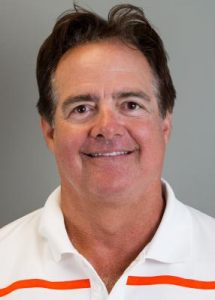
Randy Ableman, who has served as the head diving coach at the University of Miami for 28 years, celebrated yet another career victory during the 2016 Summer Olympics. Ableman’s diver, UM alumnus Sam Dorman, won a silver medal for the U.S. alongside Mike Hixon in the men’s 3-meter synchronized diving event.
Ableman describes his relationship with Dorman as more than just coach to athlete. He coached Dorman, a former Miami Hurricane who graduated in 2015, throughout all four years of his college career.
“I would say like all my divers, Sam is like one of my kids,” Ableman said. “I recruited him when he was a little high-school diver from Arizona and I’ve seen him go through so much during his time at UM. I watched him grow into a great athlete and I am proud of that.”
Dorman and Hixon received the highest overall score in the competition (98.04) on their last dive. The 4 1/2 somersault that carries a 3.8 degree of difficulty caused the American fans to go crazy as the two hit the water in perfect synchronization. Ableman stood on the deck jumping up and down.
“In one word, it was exhilarating,” Ableman said. “This was the extension and crowning jewel on our career.”
Dorman emerged from the water, pumping his fists in excitement. He looked over to Ableman and threw up the U.
Ableman was a member of the 1980 U.S. diving team, but could not attend the games in Moscow due to an American boycott. This made Dorman’s winning dive all the more special.
“I was very excited to look at him and see him so happy,” Dorman told the Miami Herald. “He didn’t get to compete in his Olympics in 1980, so to have him here and experience that with him was a very touching moment. He was one hell of a diver.”
Ableman’s Assistant Diving Coach, Dario Di Fazio, has been with him for 20 years. Di Fazio was coached by Ableman every summer from 1989-92 and in the 1992 Olympic games, where Di Fazio represented his home country of Venezuela.
Di Fazio, the godfather to Ableman’s daughter, explains that in the previous Olympics they coached, the closest they ever got to a medal was fourth place. He describes Dorman’s win as a feeling of relief and fulfillment.
“This is something we’ve been chasing for a while,” Di Fazio said. “I always believed we had a chance to get a medal. As the meet went on, it came to a reality that we had a chance. I was thinking we had a chance for third, but then I thought we could win this freaking thing.”
Ableman and Di Fazio describe coaching Dorman as a process of growth. When Dorman entered the program as a freshman, he was “all over the place” according to both of them. They said he was very inaccurate, landing on his back and stomach every day of the first year.
“On the other side, he was very talented,” Ableman said. “He was very strong and could spin so fast. He just had absolutely no control. I knew that if I could get that part of his diving under control, he would be great. It would definitely take time and would be a process.”
Ableman was able to watch Dorman grow not only as a diver, but also as a student. In school, Dorman’s aspirations of majoring in engineering were hindered by constant traveling for competitions. Ableman said that trying to be the best diver in the country while also trying to do the work it takes to be an engineer was challenging.
“Had a lot of bumps in the road,” Ableman said. “But he fought through and got a degree in engineering. He was able to get a great degree while also being national champion.”
Ableman’s success as a coach started with his own college diving career. As a native of Cedar Rapids, Iowa, Ableman attended the University of Iowa where he received a Bachelor of Science in recreation and education in 1983. The four-time All-American was the 1981 NCAA Champion in the 1-meter springboard.
After coaching the University of South Carolina diving team for five years, from 1985-89, Ableman came to Miami in 1989. Since then, he has developed the team into one of the nation’s most premier squads, earning himself the position of one the most respected diving authorities on a collegiate and national level.
Ableman has coached in seven Olympics: 1996 (Atlanta), 2000 (Sydney), 2004 (Athens), 2008 (Beijing), 2012 (London) and 2016 (Rio de Janeiro). In 2008, he coached Jenna Dreyer, representing South Africa, in the Beijing Olympic games. However, Dorman is the first athlete Ableman coached to win a medal.
“I do what I do for my athletes,” Ableman said. “All the athletes I took to the Olympics went to school at UM. This shows that when recruiting for UM, the divers I talk to are not just here to be a student and a good diver. They are here to be the best at something in the world.”
Ableman is responsible for one of the most impressive streaks in NCAA diving history: he led both the Miami men’s and women’s diving teams to win 20 combined individual NCAA championships from 1991 to 2002.
For 12 consecutive seasons, Ableman led the men and women’s diving teams to win at least one national title each year. In 1996, the Hurricanes placed first, second and third in the 3-meter springboard and 10-meter platform. In 1997, the Hurricanes won the 1-meter springboard, the 3-meter springboard and the 10-meter platform at the Men’s NCAA Championship.
Ableman, 2013 ACC Women’s Diving Coach of the Year, is a nine-time NCAA Diving Coach of the Year. He was awarded the Phil Boggs Award, an honor that is presented annually to coaches who have accomplished individual successes in the sport, and has proceeded to give back and reassure the sport’s continuation.
Aside from all Ableman’s accomplishments, he describes being a part of the Hurricane family as the most special.
“Being a diver at UM is special,” Ableman said. “We have one of the best traditions in the country. We always had great divers and I think the kids here know that. I’ve been spending a lot of time thanking everybody. So many people at UM had a piece of this success.”






